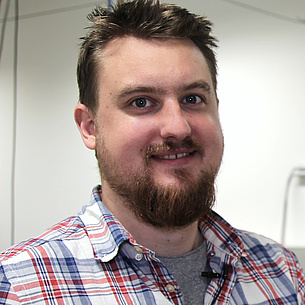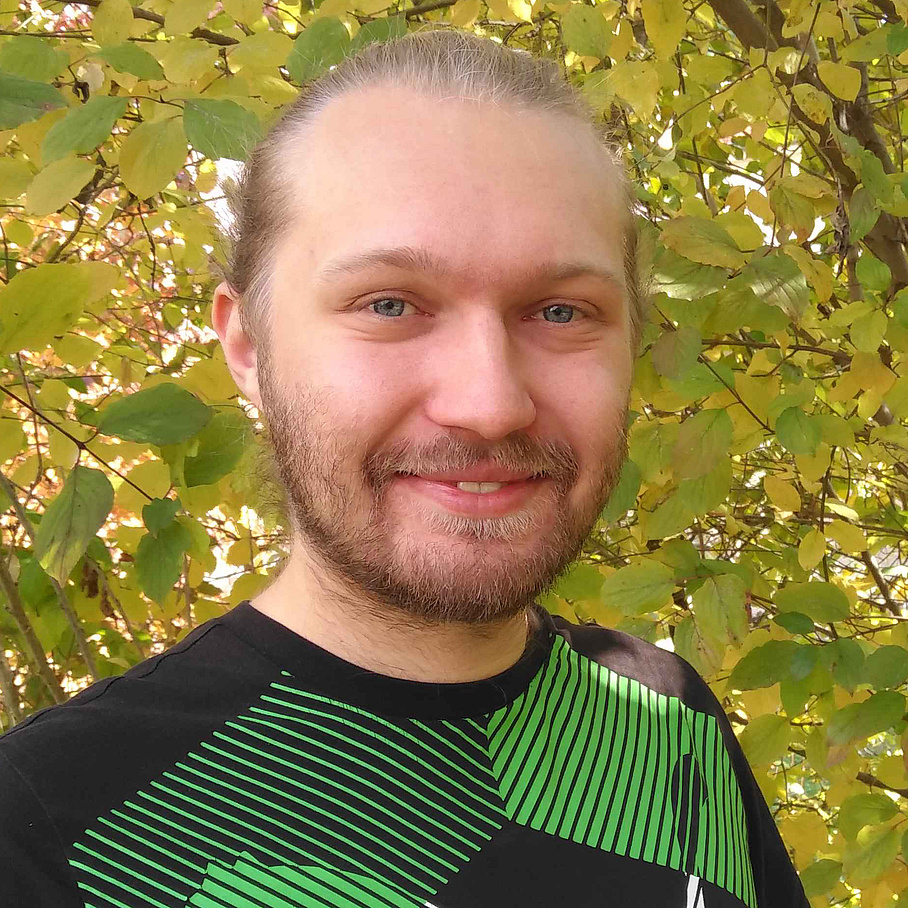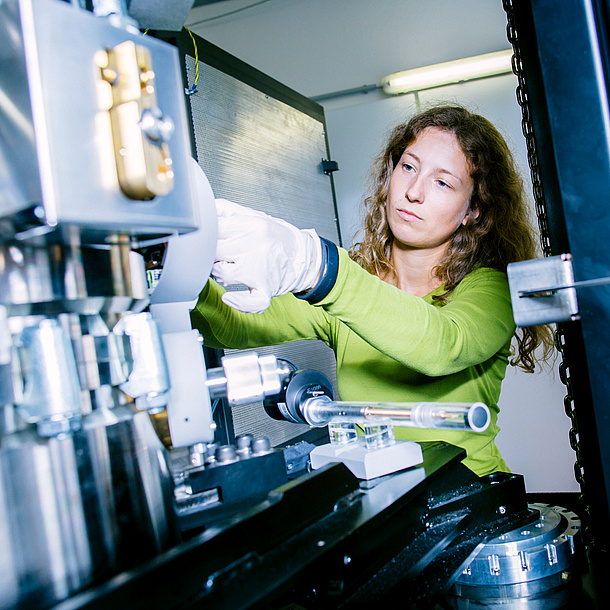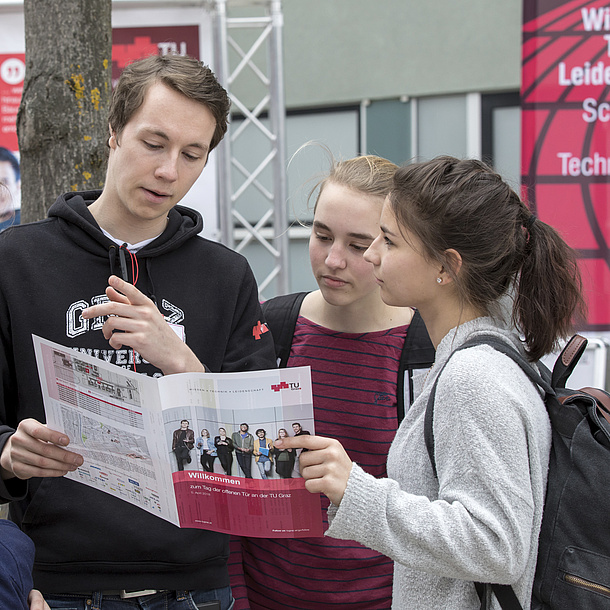Quick Facts
- Duration of study: 6 semesters
- ECTS credit points: 180
- Academic degree: Bachelor of Science (BSc)
- Language of instruction: German
The Bachelor's Programme
The NAWI Graz Bachelor's Degree Programme in Physics offers you a solid, broad-based and fundamental education in experimental and theoretical physics. Four areas play central roles in this degree programme: comprehensive mathematical training, an introduction to experimental measurement methods, theoretical or mathematical modelling and the computer simulation of physical phenomena.
Students benefit from having access to excellent research infrastructure. Specifically, they have access to state-of-the-art experimental measuring equipment, such as an electron microscope, scanning tunnelling microscope and high-resolution lasers. In an IT environment that you developed yourself, you have the opportunity to learn programming languages independently and interactively.
The degree programme places a strong focus on the connection between theory and practice. In the “Philab”, a laboratory run by students for students, you can turn your own ideas into applications. Many students also work on practical physical problems in local companies while taking part in the degree programme.
International exchange on a scientific level also plays an important role: Renowned international guest scientists regularly provide insights into their research. In the context of the Physics Colloquium, scientists give weekly lectures on current research topics.
Studying Physics
Focus Areas
You will learn more in the following subject area:
Introduction to Physics: You will learn elementary, basic physics concepts, physical measurement methods and mathematical basics. In addition, you will learn a structured programming language and apply it to solve simple physical problems.
Experimental Physics: You will become familiar with mechanics, thermal processes, electricity, magnetism and optics. In laboratory courses, you will learn how to set up experiments and carry out physical measurements independently.
Mathematical Methods: You will learn more about various mathematical topics, ranging from differential and integral calculus, linear algebra, differential equations, vector and function analysis and on to statistics and data analysis. You will learn, for example, how to formulate physical theories by using mathematical techniques and apply these to solve physics problems. The course will help improve your abstract thinking skills.
Theoretical Mechanics: You will learn how to use basic techniques in theoretical mechanics and to describe physical problems by applying the abstract methods of theoretical physics. A special focus is placed on Newtonian mechanics and relativistic mechanics, as well as others.
Atomic, Nuclear and Particle Physics, plus Quantum Mechanics: You will learn more about basic physical concepts related to elementary particles, atomic nuclei, atoms and molecules. In addition, you will become familiar with basic quantum mechanics and the methods used for mathematical descriptions.
Computer Physics and Electronics: You will gain knowledge about the elements and structure of analogue and digital circuits, as well as about sensors and numerical methods used to solve complex mathematical problems.
Electrodynamics and Thermodynamics: Among other things, you will become familiar with electromagnetic and thermodynamic problems, as well as with the main theorems applied in thermodynamics.
Molecular and Solid-state Physics and Chemistry: You will become familiar with simple problems and gain basic knowledge about chemistry and solid-state physics, as well as discuss their technical applications.
Advanced Internship and Scientific Work: You will work on practically demanding physical measurement problems that arise in the fields of optics, atomic physics and solid-state physics and carry out specific related experiments under guidance. Furthermore, you will acquire knowledge about different publication formats of scientific findings as well as about research and correct citation.
Bachelor Thesis: You will devote yourself independently to a research topic/a physical question and write a final thesis.
Elective Module: You can choose from a catalogue of different advanced courses in the fields of experimental physics, astro-geo-climate physics, or theoretical and computational physics.
Study counselling: Check what you expect!
What will I have to do in the first semesters? How much practice can I expect? And what can I actually do with my degree when I've finished? Check what you expect!
A student and a lecturer will take time for all your questions and you will get to know TU Graz during on-site appointments. Up to 10 persons can participate at each date.
Contact: lse@tugraz.at

The quote “We are a way for the universe to know itself” by the famous scientist and TV star Carl Sagan has inspired me since I was a little child. The desire to always know “why?” and “how?” led me to physics. Physics is at the centre of technological progress: many inventions, from semiconductors to medical imaging devices, are based on it. I wanted to study physics or maths for as long as I can remember.
Physics in Research and Industry
Findings from physics research helps people overcome social challenges, whether these are met in technology or economics, in resource conservation or when coping with climate change.
Knowledge obtained from the field of physics forms the basis of every technical development. Physics plays a central role in many current economic issues, including quantum computers and sustainable energy production and storage, also known as clean energy.
The TU Graz Physics Institutes are firmly anchored within the international research landscape and are involved in local and national research initiatives. Research is carried out in a wide range of fields, such as:
- computer-based materials development,
- computer simulations of biomolecules,
- experimental observations of processes on an atomic scale,
- ultra-fast spectroscopy,
- the development of novel functional and heterogeneous material systems, of sensor concepts and of nanoanalytical diagnostic tools and
- materials with properties that are dominated by quantum physics.

I can recommend the Bachelor's Degree Programme in Physics to everyone who is interested in the natural sciences and the secrets still waiting to be found. This programme places a focus on the sub-disciplines of mathematics, computer science, and, of course, physics. The balance of theoretical and practical knowledge you get in the laboratories makes the programme highly diverse. You can really gain valuable experience!
Admission
Admission Requirements
Requirements for admission to a bachelor's degree programme at TU Graz
Admission Deadlines
Summer semester 2025
Admission period: 7 January to 5 February 2025
Winter semester 2025/26
Admission period: 7 July to 5 September 2025
Admission Procedure
Questions about admission?
Contact study@tugraz.at
Perspectives for Graduates
Professional Fields
Physicists are regarded as skilled problem solvers. They are in high demand as outstandingly qualified specialists in business and science, and they have highly diverse career options. If you decide to pursue a scientific career, you will work at universities or research institutes.
In industry, you can make a career in the R&D area in a wide range of industrial sectors:
- medical technology,
- software and semiconductor industry,
- mechanical and vehicle engineering,
- aerospace technology,
- laser technology,
- optical industry,
- health care and public service, or
- in the service sector.
Your tasks include the development of new materials, new technologies, process innovations and information technology.
While it is possible to directly begin a career after graduation, graduates of this degree programme also qualify for admission to numerous advanced degree programmes, such as the Master's Degree Programme in Physics or Technical Physics, as well as Master's Degree Programmes in Astrophysics, Geophysics, Advanced Materials Science and Environmental Systems Science.
Advanced Master’s Degree Programmes
After completing the bachelor's degree programme, you can enrol in the following master’s degree programmes without further requirements:
- Physics
- Technical Physics
- Advanced Materials Science
- Green Process Engineering
- Space Sciences and Earth from Space
- Data Science
Information on other master's degree programmes with requirements you can find on the respective pages for the master’s degree programmes.
In addition, the bachelor's degree offers you the opportunity to apply internationally for master's degree programmes.

As a child, I wanted to grow up to be a pilot of a spaceship or an astronaut. My interest in natural sciences and technology steadily grew until I graduated from high school. It was clear to me that I wanted to study at a technical university. I chose to enter the field of technical physics, because I saw it as an opportunity to get uncover the secrets of the universe and, at the same time, to demonstrate what I had learned in real life.
More about Peter Pichler and his work at the Institute of Experimental Physics

The Bachelor's Degree Programme in Physics is a very broad programme, training physicists who serve as a kind of "Swiss army knife" in the professional world. No matter whether mathematical skills, adept handling of computers and programming, a basic understanding of physics, or simply scientific curiosity is required: Physicists are needed for almost all technical tasks.





